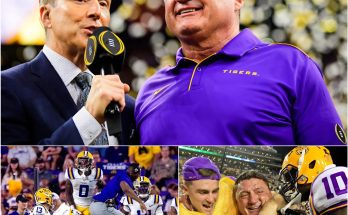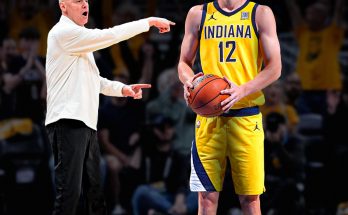Micah DeBose, a standout offensive lineman, has officially committed to Alabama, and he didn’t make the decision lightly. In explaining his choice, DeBose pointed to three powerful reasons that drew him to the Crimson Tide—reasons that go beyond tradition and into personal belief, development, and championship ambition.
Micah DeBose, a powerful and highly-regarded offensive lineman, made headlines when he announced his commitment to the Alabama Crimson Tide. The decision, while a major win for Alabama’s 2026 recruiting class, came after careful thought and reflection on what mattered most to him. A native of Mobile, Alabama, DeBose carries not just size and strength, but also a rare maturity for a high school junior. For DeBose, the commitment wasn’t solely about football. It wasn’t just about who had the best stadiums, facilities, or NIL deals. When he finally made his decision public, he shared three compelling reasons for choosing Alabama—and those reasons reflect the values that have driven his football journey.
The first and perhaps most heartfelt reason DeBose chose Alabama was trust. Trust in the coaching staff, trust in the program’s vision, and trust in how the Crimson Tide would develop him as both a player and a person. In a modern recruiting world often dominated by flash and social media hype, DeBose spoke sincerely about how the conversations with Alabama’s staff felt different. They weren’t all about football. They were about who he was as a young man, where he came from, and where he wanted to go. That level of personal investment from the coaches, particularly from head coach Kalen DeBoer and offensive line coach Chris Kapilovic, made an impact. DeBose said that Alabama’s pitch to him wasn’t centered on selling a dream, but on building a foundation. He could tell they were serious about helping him reach his full potential on the field—but also about shaping him into a responsible adult ready for life after football.
That message resonated deeply with DeBose, who has always been surrounded by a support system that emphasized accountability and leadership. His parents and mentors didn’t raise him to chase quick fame or easy promises. They taught him to look for substance. That’s what he felt from Alabama. He noted how Kapilovic took time to break down his film and explain exactly what areas he could improve. He appreciated the honesty, especially in a recruiting cycle where many coaches shy away from constructive criticism. That approach earned his respect. Instead of just hearing what he wanted to hear, he was told what he needed to hear. That built trust—and in a decision as big as this, trust was everything.
The second major factor behind DeBose’s commitment was development. For a player of his caliber—6-foot-5, 315 pounds and already boasting elite athleticism—the next few years will be crucial. DeBose has the raw tools to dominate at the next level, but he knows development will make or break his career. He didn’t just want to be a good college lineman. He wanted to be great. He wanted to be one of the best in the country, and eventually make it to the NFL. Alabama’s history of producing elite offensive linemen gave him the confidence that the program could get him there.
Throughout Nick Saban’s legendary tenure, and now under DeBoer’s leadership, Alabama has consistently molded linemen into professionals. The names speak for themselves—Evan Neal, Cam Robinson, Jedrick Wills, Ryan Kelly, and many more. That tradition hasn’t faded. Even with the coaching transition from Saban to DeBoer, Alabama’s commitment to excellence in the trenches remains intact. DeBose recognized that. He talked about watching Alabama’s linemen on film and being impressed with their discipline, their footwork, and their physicality. He wanted to be part of that lineage, part of that standard of play. And more than that, he wanted to be developed in a system that would challenge him. He doesn’t fear hard work—he thrives on it.
Development, though, wasn’t just about technique or lifting weights. DeBose emphasized how Alabama’s program focuses on the total player—mental toughness, nutrition, academic support, leadership training. That holistic approach appealed to him. He saw Alabama not just as a football powerhouse, but as a place where he could grow into a better version of himself. Every visit to Tuscaloosa reaffirmed that belief. Every conversation with the staff left him feeling more confident that Alabama would push him—and help him push himself—to levels he hadn’t yet reached.
The third and final reason behind DeBose’s decision was the pursuit of championships. As simple as it sounds, winning matters. And when it comes to winning, Alabama’s reputation speaks for itself. The Crimson Tide aren’t just competing—they’re expected to contend every single year. That standard appealed to DeBose’s competitive nature. He’s not looking to just play college football. He’s aiming for legacy. He’s aiming for rings, banners, and unforgettable moments under the brightest lights.
In choosing Alabama, DeBose saw a path to greatness. He talked about how the culture at Alabama is built on expectations. Not just from coaches, but from players and fans alike. Everyone expects the best. That pressure doesn’t scare him—it fuels him. DeBose is the kind of player who welcomes the weight of high expectations because he holds himself to those same standards. He understands that being part of Alabama football isn’t just about wearing the jersey—it’s about living up to the legacy of those who came before. And more importantly, it’s about leaving something behind for those who come after.
What’s remarkable about DeBose’s commitment isn’t just the timing—making his decision early in the 2026 cycle—but the clarity he already has at such a young age. While many prospects waver, chase attention, or delay decisions for the sake of drama, DeBose acted with conviction. He knew what he wanted in a program. He knew what values mattered most to him. And when he found a program that aligned with those values, he didn’t hesitate.
Alabama fans should be excited—not just because they landed a 4-star offensive lineman with sky-high potential, but because they’ve added a player who genuinely understands what it means to be part of something bigger. DeBose isn’t chasing headlines. He’s chasing legacy. He’s chasing excellence. And in Alabama, he believes he’s found the perfect place to pursue both.
For Kalen DeBoer, this is another strong statement in his effort to keep Alabama’s dynasty rolling. The program’s first full recruiting cycle under his watch is already gaining steam, and landing a player like DeBose only adds momentum. It also sends a message to other top prospects across the country: Alabama is still Alabama. The process, the standards, and the winning culture remain firmly in place.
DeBose’s commitment is also a reminder that the best recruits still care about the fundamentals—trust, development, and championships. In an era where NIL and social media often dominate headlines, there’s something refreshing about a young man making a decision based on character and vision. DeBose didn’t pick the flashiest offer or the loudest pitch. He picked the one that aligned with who he is and who he wants to become.
His high school coach has often said that Micah DeBose is the kind of player who brings everyone around him up. That trait is hard to teach, but it’s invaluable in a team setting. DeBose isn’t just a future starter—he’s a future leader. Someone who won’t just block defensive linemen but will also hold teammates accountable, bring energy to the locker room, and represent the university with pride. Alabama has built championship teams around players like that for decades, and with DeBose in the fold, it looks like that tradition will continue.
It’s early, of course, and the 2026 recruiting cycle is still in its early stages. But commitments like DeBose’s can set the tone for an entire class. Already, other recruits are taking notice. His decision will undoubtedly influence others who are looking at Alabama and wondering if it’s still the place to be. With players like DeBose leading the charge, the answer appears to be a resounding yes.
For now, DeBose will return to his high school grind—honing his craft, staying humble, and working every day to get better. But the future is clear. His next chapter will be written in Tuscaloosa, in front of 100,000 roaring fans, under the lights of Bryant-Denny Stadium. And if everything goes according to plan, that chapter will be filled with hard-fought wins, team triumphs, and personal growth.
Micah DeBose believes in Alabama. And after hearing his reasons, it’s easy to see why Alabama believes in him.


